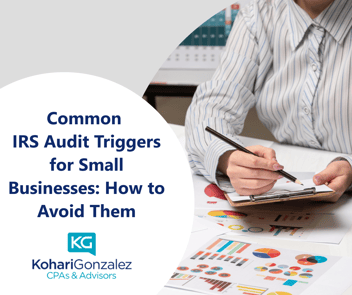With the tax deadline approaching, I thought I'd check in today to give you some tips on how to avoid getting into trouble this tax season.
And, well, any tax season for that matter.
Now... sometimes, Charlotte clients are referred to us by other Charlotte professionals because they have gotten themselves into trouble with the IRS and are under the scrutiny of the IRS auditors.
Hopefully, you haven't had that experience.
And let's make sure that doesn't happen again. Here's how to do it.
Charlotte taxpayers are audited in six different ways.
“What is once well done is done forever.” – Henry David Thoreau
We don't want you to have to deal with the stress of an audit. Nobody likes being audited, therefore we've compiled a list of the "big six" ways that most Charlotte residents wind up being audited. Simply avoiding these isn't a surefire strategy, but it certainly helps.
Here are some of the major red flags we look for while preparing and submitting tax returns...
1. Indefensible assertions
There are numerous old wives' tales claiming that specific items, such as home office deductions, passive losses, schedule C (sole proprietorship) activities, and so on, will result in an IRS audit. But you can't predict the trigger, and trying to do so can drive you insane. You can, however, apply the "be reasonable" motto to all of the items on your return, including these. So don't claim a home office if you don't have a good case for it. Treat your money-losing sole proprietorship like an enjoyable pastime if that's what it is.
Look, don't be afraid to claim all of the deductions and losses you're entitled to, but don't adopt tax positions you can't justify. If you take fair tax stances, you won't have to defend them very often. And if you do have to face an IRS audit, it will most likely be much less difficult.
2. The numbers don't add up.
Make sure you add, subtract, and multiply correctly, even if it seems like it should go without saying. Check your numbers as you go through each step, and after you're finished, conduct some simple math checks. If you make a math error, the IRS is likely to send you a math correction notice. This isn't a formal audit. However, you want to keep your interactions with the IRS bureaucracy to a minimum, as it isn't known for having the best mail processing methods.
3. I've lost 1099.
This is complicated by the fact that there are several types of Form 1099, including 1099-INT for interest, 1099-DIV for dividends, 1099-G for tax refunds, 1099-R for pensions, and 1099-MISC for miscellaneous income. Payers of such funds send these paperwork to both you and the IRS.
So, no matter how many 1099s you get, make sure you account for them all on your tax return. There are also Forms 1098, which lenders submit (to both you and the IRS) to document the amount of interest you paid. The IRS compares your tax return against the 1098s and 1099s. So failing to account for something is a surefire way to get an IRS audit! If a Form 1099 is incorrect, such as reporting more income than you actually earned, you can explain or deduct it on your tax return, but you must first disclose it.
4. Unusual OVER-reporting
I'm not referring about underreporting income or withholding vital information. However, you'd be astonished at how many Charlotte professionals and amateurs attempt to submit too much *supporting* data. True, if your return is complicated, you may need to include footnotes with explanations or disclosures. Be succinct, truthful, and accurate, but don't include copies of sales agreements, settlement agreements, bank statements, or other documents unless the IRS specifically requests them.
Regular paper or special IRS forms can be used to make disclosures. Any time you need to reveal information that can't be effectively reported on the forms, you can utilise a plain paper Form 8275 "Disclosure Statement." The “Regulation Disclosure Statement,” Form 8275-R, is used to disclose positions that are in violation of IRS regulations or other authority. Without expert assistance, you should not file a Form 8275-R –or take a tax return position that requires it.
5. Getting into pointless fights
Why should you pay a charge if the IRS gives you one if you take appropriate tax positions and file your return accurately, double-checking your math?
To be honest, it's more a question of pragmatism (and wisdom) than of principle. It's just not worth it to fight the IRS over minor issues. So, instead of risking worse issues for a little dollars, avoid the bureaucratic system. Simply pay it and get on with your life.
6. Ticky-Tacky Year-to-Year Corrections
The scenario is the polar opposite of what I just said: revised returns are scrutinised considerably more frequently than initial returns. So, if you forgot a deduction or otherwise believe you might get a tiny refund by changing your return, think carefully (i.e., speak with a pro). Consider whether you'll have more troubles if other aspects of your return are examined that aren't related to the amendment. You can win a war... and then lose a bigger one.
Finally, no matter how cautious you are, there is no way to guarantee that you will never be involved in a tax dispute. It's possible that your phone number will just pop up.
And if your number is called, we'll walk beside you...
Warmly,
Sara F Gonzalez
(704) 599-3355
Kohari & Gonzalez PLLC



